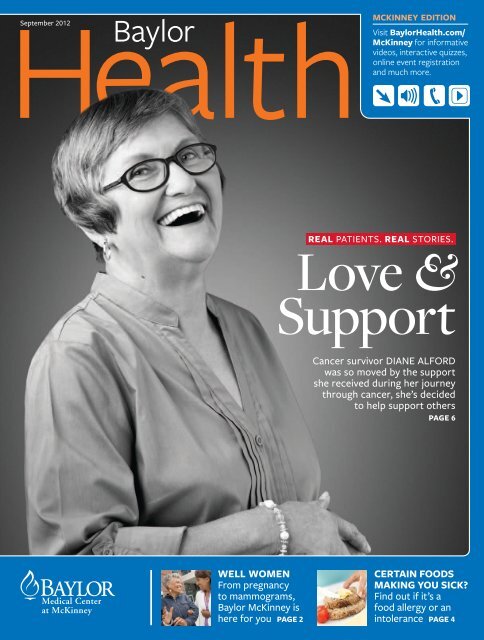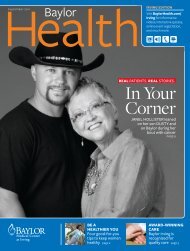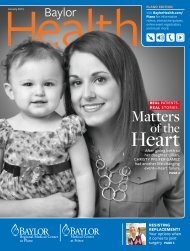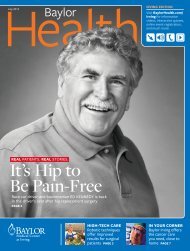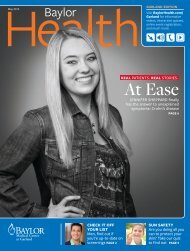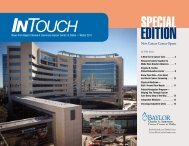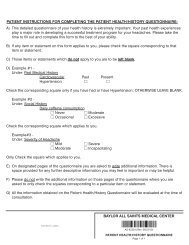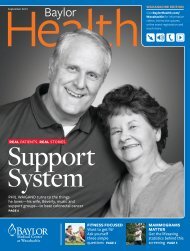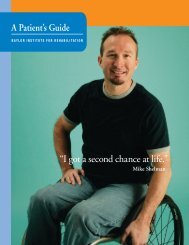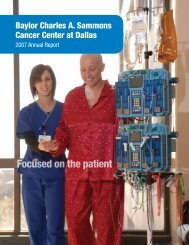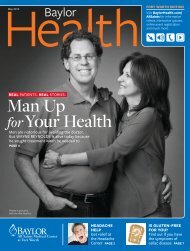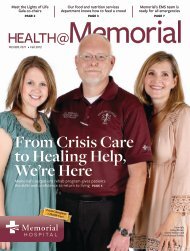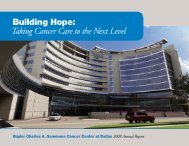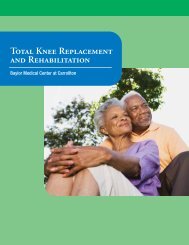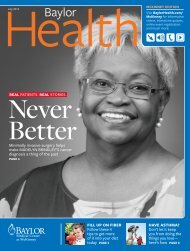McKinney - Baylor Online Newsroom - Baylor Health Care System
McKinney - Baylor Online Newsroom - Baylor Health Care System
McKinney - Baylor Online Newsroom - Baylor Health Care System
Create successful ePaper yourself
Turn your PDF publications into a flip-book with our unique Google optimized e-Paper software.
<strong>Health</strong>September 2012<strong>Baylor</strong>Mckinney EditionVisit <strong>Baylor</strong><strong>Health</strong>.com/<strong>McKinney</strong> for informativevideos, interactive quizzes,online event registrationand much more.real PATIENTS. real STORIES.Love &SupportCancer survivor DIANE ALFORDwas so moved by the supportshe received during her journeythrough cancer, she’s decidedto help support otherspage 6Well WomenFrom pregnancyto mammograms,<strong>Baylor</strong> <strong>McKinney</strong> ishere for you page 2Certain FoodsMaking You Sick?Find out if it’s afood allergy or anintolerance page 4
Just for Women➜<strong>Baylor</strong> <strong>McKinney</strong> offers compassionate carefor every stage of your lifeWhether you’re pregnant, due for your first mammogramor anywhere in between, the newly opened <strong>Baylor</strong> MedicalCenter at <strong>McKinney</strong> is here for you with a comprehensiveand family-friendly women’s health center.“We’re pleased to offer women’s care for every age andstage of life,” says Ethel Randall, MBA, RT, director ofbreast imaging for <strong>Baylor</strong> <strong>Health</strong> <strong>Care</strong> <strong>System</strong> and <strong>Baylor</strong><strong>McKinney</strong>. Here, we take a closer look at the wealth ofwomen’s services available at <strong>Baylor</strong> <strong>McKinney</strong>.Well-Woman <strong>Care</strong>When it comes to staying well, annualscreenings, such as mammograms, goa long way toward detecting problemsin their earliest, most treatable stages.But, let’s be honest, those importanttests are something most of us dread.Thankfully, <strong>Baylor</strong> <strong>McKinney</strong>’sWomen’s Imaging Center goes theextra mile to make those uncomfortablenecessities as painless—andeffective—as possible.“When you come to our hospitalfor well-woman care, you’ll enjoy cozysurroundings, free coffee, and warmblankets and robes for your comfort,”Randall says.And when it’s time for yourmammogram? Relax. “Our highlytrained staff includes speciallytrained mammographers, and thatmeans less painful and more effectivemammograms for patients,” Randallsays. “And we offer advanced imagingtechnology, including digital mammographyand DEXA bone densitometryscans, so you know you’re gettingquality, effective screenings.”<strong>Baylor</strong> Medical Center at <strong>McKinney</strong>, 5252 W. University Drive, <strong>McKinney</strong>, TX 75071. President: Scott Peek; Marketing/Public Relations Director: Kelly Maier; Editor: Jennifer Irwin. <strong>Baylor</strong> <strong>McKinney</strong> Main Number:469.764.1000; Parent Education Classes: 1.800.4BAYLOR (1.800.422.9567); <strong>Baylor</strong> <strong>McKinney</strong> Breast Center: 469.764.7000; <strong>Baylor</strong> <strong>McKinney</strong> Physician Referral: 1.800.4BAYLOR. Visit <strong>Baylor</strong><strong>Health</strong>.com/<strong>McKinney</strong> orcall 1.800.4BAYLOR for information about <strong>Baylor</strong> <strong>McKinney</strong>’s services, upcoming events, career opportunities and more.<strong>Baylor</strong> <strong>Health</strong> <strong>Care</strong> <strong>System</strong> Mission: Founded as a Christian ministry of healing, <strong>Baylor</strong> <strong>Health</strong> <strong>Care</strong> <strong>System</strong> exists to serve all people through exemplary health care, education, research and community service.The material in <strong>Baylor</strong><strong>Health</strong> is not intended for diagnosing or prescribing. Consult your physician before under taking any form of medical treatment or adopting any exercise program or dietary guidelines. Physiciansare members of the medical staff at one of <strong>Baylor</strong> <strong>Health</strong> <strong>Care</strong> <strong>System</strong>’s subsidiary, community or affiliated medical centers and are neither employees nor agents of those medical centers,<strong>Baylor</strong> Medical Center at <strong>McKinney</strong> or <strong>Baylor</strong> <strong>Health</strong> <strong>Care</strong> <strong>System</strong>. Photographs may include models or actors and may not represent actual patients. <strong>Baylor</strong><strong>Health</strong> is published by McMurrysix times a year for friends and supporters of <strong>Baylor</strong> Medical Center at <strong>McKinney</strong>. © 2012 <strong>Baylor</strong> <strong>Health</strong> <strong>Care</strong> <strong>System</strong>. If you are receiving multiple copies, need to change your mailing addressor do not wish to receive this publication, please send your mailing label(s) and the updated information to Robin Vogel, <strong>Baylor</strong> <strong>Health</strong> <strong>Care</strong> <strong>System</strong>, 2001 Bryan St., Suite 750, Dallas, TX75201, or email the information to robinv@baylorhealth.edu.2 <strong>Baylor</strong><strong>Health</strong>.comGrandmother and granddaughter: ©Photoshot; mammogram: ©Jupiterimages
Childbirth ServicesWhen most people think of laborand delivery suites, beautiful andspacious are not the first words thatcome to mind. But <strong>Baylor</strong> <strong>McKinney</strong>’swomen and infants’ department willchange that. “Our labor and deliverysuites are advanced in terms of formand function,” says Deb Maitre, MS,RNC-OB, director of women andinfants’ services at <strong>Baylor</strong> <strong>McKinney</strong>.“They provide just the right amount oftechnology in a warm but contemporary,hotel-like atmosphere. Best of all,they are designed to provide a familycenteredbirth experience.”After delivery, you and your newbaby will move into a private suite inthe New Family Center. Featuring thesame soothing colors, ambient lighting,flat-screen TVs, wireless Internetand plush, comfortable twin-size bedsfor your support person as the laborand delivery suites, you might neverwant to check out.And should your baby require additionalcare after birth, it’s comfortingto know that the hospital’s Level IIINICU (neonatal intensive care unit)offers private suites where parentscan stay with theirinfant 24 hours a day,a first of its kind inCollin County.Women’s Cancer <strong>Care</strong>If you or a woman you love is facingbreast, cervical, endometrial, ovarianor uterine cancer, <strong>Baylor</strong> <strong>McKinney</strong>offers woman-centered care, advancedtreatment programs and a team ofcancer care professionals.“We truly personalize cancer careto each and every patient,” saysMelissa Winter, MSN, RN, NEA-BC,chief nursing officer and chief operatingofficer at <strong>Baylor</strong> <strong>McKinney</strong>. “Whilea cancer diagnosis is terrifying foranyone, these kinds of cancers areparticularly traumatic for women, andwe compassionately care for thesebrave patients accordingly.”Don’t Put It OffGo to <strong>Baylor</strong><strong>Health</strong>.com/<strong>McKinney</strong>BreastImaging toschedule your annual screeningmammogram and to find moreinformation.To-Do Today:BreastSelf-ExamNo more excuses. It’s time to makebreast self-exams part of yourmonthly routine. “Breast self-examshelp women learn the normal feeland look of their breasts, whichmakes it easier to notice slightchanges, should they occur,” saysEthel Randall, MBA, RT, director ofbreast imaging for <strong>Baylor</strong> <strong>Health</strong><strong>Care</strong> <strong>System</strong> and <strong>Baylor</strong> MedicalCenter at <strong>McKinney</strong>. Follow thesetips to make this important exameven more effective.• It only works if youremember to do it.Set a monthly reminderfor the same day eachmonth in your phoneor email calendar.• Do it right,every time. Hanga breast self-exam showercard over your showerhead.Download a free showercard at <strong>Baylor</strong><strong>Health</strong>.com/<strong>McKinney</strong>BreastImaging orrequest one by calling our NurseNavigator Line at 214.820.3535.• Talk to your doctor. Reportany suspicious change to yourphysician, no matter how small orinsignificant you may think it is.1 out of 8The number of births in which preterm labor occurs,meaning before the 37th week of pregnancy.Ultrasound: ©Getty Images/Creatas RF; patient and doctor: ©Blend Images/Photoshot <strong>Baylor</strong><strong>Health</strong>.com 3
SpecialOrderDo certain foods makeyou sick? Find out if it’san allergy or an intolerance“NO ONIONS, PLEASE. I’M ALLERGIC.”How often do you hear statementslike that when dining out with friendsor family? Although it may very well betrue, it’s more likely that your diningcompanion has an intolerance to the foodin question, rather than an actual allergy.“It’s a big misconception,” says RassaShahidzadeh, MD, a gastroenterologiston the medical staff at <strong>Baylor</strong> RegionalMedical Center at Plano. “Having areaction when you eat a particular fooddoesn’t necessarily mean you have anallergy.”WHat’s tHe diFFerenCe?So what distinguishes an allergy froman intolerance?“An allergic reaction produces serious—even deadly—symptoms, like rash,respiratory distress, gastrointestinalproblems and shock,”Dr. Shahidzadeh says.“An intolerance is whenyou eat something andyou don’t like the wayyou feel after.”For example, whenpeople who are lactoseintolerant drink milk,they may experience gas,cramping and diarrhea,but the symptoms eventually pass ontheir own once the milk is out of thesystem. Allergic reactions, on the otherhand, worsen without treatment.a tHird possiBilitYAnother condition that is often confusedwith food allergies is celiac disease. “It’sneither an allergy nor an intolerance,”Dr. Shahidzadeh says. “Celiac diseaseis a genetic disorder in certain peoplewho get very sick when they eat a typeof wheat called gluten. In these people,their immune system reacts to gluten,causing damage to the bowel.”Symptoms range from bloating,cramping, diarrhea and blood in thestool to seemingly unrelated side effectssuch as liver abnormalities, hair lossand tooth decay. Even though onein a hundred Caucasians in the U.S.Find OutIf You HaveFood AllergiesDo you have a reactionto certain foods?For a referral to agastroenterologiston the medical staffat a <strong>Baylor</strong> <strong>Health</strong> <strong>Care</strong><strong>System</strong> medical center,visit Finddrright.comor call 1.800.4BaYlor.have celiac disease, anestimated 97 percentdon’t know they have it,according to the CeliacDisease Foundation.WHat to doIf you think you havea food allergy orintolerance, or celiacdisease, talk to yourdoctor. It’s important to get a diagnosis.Treatment for each condition alwaysinvolves avoidance of the food that givesyou a reaction. If you have an intolerance,you can try substitution products likelactose-free milk. But Dr. Shahidzadehstresses the importance of strict avoidanceof gluten for those with celiac disease.“Avoid it as if it’s poison,” he says. “Andbe on the lookout for gluten in productsyou would never guess it’s in, like hotdogs, salad dressing and even lipstick.”8The number offoods that accountfor 90 percent offood allergens: milk,eggs, peanuts, treenuts, wheat, soy, fishand shellfish.4 <strong>Baylor</strong><strong>Health</strong>.comBoy: ©Getty Images/Goodshoot RF; bread: ©Stockbyte
eal PATIENTS. real STORIES.The SecretIs SupportGetting through breast canceris all about what you do to dealWhen Diane Alford, 62, retiree, received her breast cancerdiagnosis, she turned to her church family for support.“My church family took me to my chemo treatments andcame by to help with cooking and cleaning,” she says.Alford also drew on an existing relationship with a nurse inher life. “My ex-mother-in-law is a nurse, and she took it uponherself to be at my side every step of the way. She basicallyheld my hand all the way through it.”Maria Baker, 41, a child care provider and mother of twoyoung boys, shared the news with her husband first. “He’smy best friend and we’re very close,” Baker says. “He wasmy primary support person every step of the way.”Baker also drew support through social networking.“I used Facebook a lot to connect with other cancerpatients and to update my extended family inItaly,” she says.If you’re facing breast cancer, it’s importantto find a support structure that works foryou. It may include family and friends, asit did for Alford and Baker. Or you mayfind your own route. Whatever it is,choose something.Watch Diane’s StoryTo hear more about Diane’s journey through breastcancer, visit <strong>Baylor</strong><strong>Health</strong>.com/exclusive today.Diane Alford drew support from her church family during her illness.6 <strong>Baylor</strong><strong>Health</strong>.com
“Women who feelsupported duringtreatment fare betterthan those who ‘sufferin silence’ during theircancer journey,” saysHeidi Jordan, MD, anoncologist on the medicalstaff at <strong>Baylor</strong> Regional Medical Centerat Grapevine. “They perceive their sideeffects to be less severe and managebetter emotionally in the long run.”While Alford and Baker drew strengthand support through different channels,their outcomes were similarly positive.Both made it through their ordeal withflying colors and are cancer-free today.“Experiencing a breast cancerdiagnosis—and the months of difficulttreatment that follow—is one of themost challenging things a woman cango through,” says John Pippen, MD, amedical oncologist on the medical staffat <strong>Baylor</strong> University Medical Center atDallas. “You want to rally your friendsand family around you and take advantageof the great resources available.”Here are some common ways breastcancer patients can get that criticalsupport:FaMilY and FriendsFor most people, immediate family andclose friends offer the kind of hands-oncare and intimate emotional support thatis so critical during cancer treatment.In fact, many people find that theirrelationships are strengthened anddeepened through their breastcancer journey.Baker says she couldn’t havemade it through without theunwavering support of her familyand friends. “I never felt alonethroughout the entire process,”Baker says. “There was alwayssomeone by my side, either physicallyor emotionally, to share the burden.”support groupsSupport groups offer anopportunity in a safe, openenvironment to connect andshare with others who havesimilar diagnoses.Are You a<strong>Care</strong>giver?Learn tips on how tocare for a friend or lovedone who has cancer bylistening to our podcastat <strong>Baylor</strong><strong>Health</strong>.com/Cancerpodcast today.Alford says she leanedheavily on a supportgroup for cancer patientsduring her treatment.“They offered emotionalsupport and connectedme to importantresources that ultimatelyhelped pay for my treatment,” she says.Today, Alford runs a cancer supportgroup she started at her church. “I wantedto help others by giving them the samesupport I had,” she says.ForuMs and soCialnetWorks<strong>Online</strong> forums offer a unique opportunityto share thoughts, feelings and personalexperiences anonymously. Many peoplefind social networks like Facebook usefulas well, not only for sharing updates withconcerned friends and family membersbut also as a way to connect with othersfacing similar diagnoses.Baker, for example, received privatemessages from old friends after sheshared her diagnosis on Facebook.“A few of my friends from high schoolwere battling breast cancer as well, sowe kept in touch online and checkedin on each other throughout ourtreatment programs.”a CanCer naVigator“A breast cancer diagnosis requires manysteps from start to finish, and patientshave a lot of questions and decisionsto make,” Dr. Jordan says. “The breastnurse navigator can answer thosequestions, guide you through each stepand help you understand your choices.They make everything seem manageablein an otherwise overwhelming and veryfrightening process.”Baker learned the value of this supportduring her journey. “The breast nursenavigator at <strong>Baylor</strong> Grapevine was anangel,” she says. “After my diagnosis,I thought, ‘Now what?’ She guided methrough every step—from helping mefind the right doctor to scheduling myappointments to just talking me throughthe emotions I was having.”a proFessional Counseloror tHerapist“For breast cancer patients who wantadditional support beyond what friends,family and support groups can offer,professional counseling can helpthem find new ways to cope with theemotional aspects of a breast cancerdiagnosis,” Dr. Pippen says. “Yourtherapist can help you deal with thosefeelings in a safe, open environment.”Which -ectomy Is Right for You?For women facing abreast cancer diagnosis,the decision of whether toundergo lumpectomy ormastectomy is a dauntingone. Here, Anil Bhogaraju,MD, an oncologist onthe medical staff at<strong>Baylor</strong> Medical Centerat Carrollton, explainsthe difference and whichmight be right for you.lumpectomy is theremoval of the tumorand a small amountof surrounding tissue.“For most women,lumpectomy is the bestoption,” Dr. Bhogarajusays. “It’s an outpatientsurgery and has fewercomplications, lesspain and a lower riskof infection thanmastectomy. Plus, it is aseffective as mastectomywhen combined withradiation therapy.”Mastectomy is thecomplete removal ofbreast tissue. “Thereare a few cases wheremastectomy is a betterchoice,” Dr. Bhogarajusays. “For example, ifthe tumor is very largeand the breast is small,a lumpectomy wouldleave the patient with avery misshapen breastwhile mastectomy wouldallow for a completereconstruction. Anothercase would be whencancer appears inmultiple areas or whena patient is unable totolerate radiation.”Talk to your oncologistto determine whichoption is right for you.<strong>Baylor</strong><strong>Health</strong>.com 7
GettingWeight LossRightTips to help when thescale just won’t budgeThis week you walked five miles, skipped yourdaily soda and even shunned those chocolatecupcakes in the break room at work. Yet whenyou stepped on the scale, there was no rewardfor your efforts and restraint. What gives?While you’re trying to be “good,”you could actually be bunglingyour weight loss efforts without even knowingit. With help from Colleen Kennedy, MD, abariatric surgeon on the medical staff at <strong>Baylor</strong>Regional Medical Center at Plano, we’ll showyou some common ways that many of us getweight loss wrong—and how to get thescale moving in the right direction.
WHAT YOU MAY BE GETTING WRONGPortion sizesWith foods like muffins, which were once smaller than abaseball and are now larger than a softball, it’s easy to seewhy we misjudge how much we should really be eating.“A single serving of protein is just 4 ounces, which isabout the size of a deck of cards, yet most people end upeating much more than that,” Dr. Kennedy says.HoW to get it rigHt: Use common objects (likecards) or even your hand to gauge proper portion sizes.But until you get the hang of it, measure your meals withan inexpensive kitchen scale. According to Dr. Kennedy,the average meal should contain about 4 ounces of protein,4 ounces of vegetables and about a quarter cup of complexcarbohydrates such as beans or brown rice.WHAT YOU MAY BE GETTING WRONGNot counting the small stuffThe vanilla syrup in your nonfat latte. Thegarlic mayo on your chicken sandwich. Sure,they weren’t the main attraction of yourmeal, but extras like these quickly add up. And if you’re notcounting them, you’re not fully aware of what you’re eating.HoW to get it rigHt: Dr. Kennedy recommendskeeping track of your carbohydrate, fat, protein and calorieintake in a food diary so you know how much you’re reallyeating and can make adjustments as needed.WHAT YOU MAY BE GETTING WRONGBeing impatientWhile dropping a pound or two per week is the safe way to loseweight, “we get frustrated with that,” Dr. Kennedy says. “Wewant 10 pounds off in a week. But if you’re losing that much,you’re losing water weight and you’re not going to keep it off.”HoW to get it rigHt: When it comes to weight loss,patience really is a virtue.“Slow and steady always works the best and keeps the weightoff longer,” Dr. Kennedy says.Having Trouble Losing Weight?Talk to your doctor about what might be behind yourinability to lose weight. To find a doctor on the medical staffat <strong>Baylor</strong>, visit Finddrright.com or call 1.800.4BaYlor.WHAT YOU MAY BE GETTING WRONGLabel-readingProcessed foods can sabotageyour diet with sneaky labeling.Beyond claims about reducedfat or sugar, they may use termslike “natural,” “wholesome” oreven “organic” to reel us in. Butorganic chips still have calories—often just as many as regular potato chips.HoW to get it rigHt: “If something says fat-free,it usually has a lot of sugar, and if it’s sugar-free, it likelycontains more fat,” Dr. Kennedy says. “You have to look atthe labels carefully.”Avoiding processed foods altogether may be your bestoption. “Eating fresh fruits and vegetables and cooking yourmeat products from scratch is much better for you and willactually end up filling you up more,” she says.WHAT YOU MAY BE GETTING WRONGSkimping on proteinExercising is obviously great for burning calories, but it’snot all your body is burning, Dr. Kennedy says. “If you’renot getting enough protein and you’re exercising, your bodywill absolutely attack your muscle stores to get it, because itneeds protein to live.”HoW to get it rigHt: The average woman needsabout 60 grams of protein per day, and men need 80 to100 grams. And if you’re working out heavily, you’ll needeven more, Dr. Kennedy says. She suggests a boost of postworkoutprotein, such as a slice of low-fat cheese wrappedwith lunch meat, to help rebuild muscle.Supplementing Your EffortsEven when you’re doing your best to eatright, you still may not be getting theessential vitamins and minerals you need.Colleen Kennedy, MD, a bariatric surgeonon the medical staff at <strong>Baylor</strong> RegionalMedical Center at Plano, recommends:a daily multivitamin. “Unfortunately,our processed foods don’t have enoughvitamins,” she says. “And because evenour vegetables and fruits are processedmore to keep them safe to eat, theydon’t have the nutrients they used tohave either.”a calcium supplement withadded vitamin d. “We’ve beenwatching vitamin levels and routinelywhen we check, people are deficient invitamin D, which is needed for healthybones,” Dr. Kennedy says.an isolated vitamin d supplement.Many people may also need a separatevitamin D supplement for a couple ofreasons. “We’ve discovered we need ahigher level of vitamin D than we thoughtin the past,” she says. “And with thecombination of diet and staying out ofthe sun to prevent skin cancer, we’re notgetting enough vitamin D anymore.”To ensure you’re getting the rightamounts of vitamins and minerals tomeet your specific needs, Dr. Kennedyrecommends working with your doctorto have your levels checked.Woman on scale: ©Getty Images/Creatas RF; woman reading food label: ©Jupiterimages <strong>Baylor</strong><strong>Health</strong>.com 9
Decades of Research and ResultsNearly 20 years of study is revealing important information about colorectal cancerAN ONGOING RESEARCH STUDY at<strong>Baylor</strong> has already made importantdiscoveries about hereditary colorectalcancer. And as the project heads intoits 18th year, researchers are focusedon better identifying people at thehighest risk.Led by C. Richard Boland, MD,chief of gastroenterology for the GICancer Research Laboratory at <strong>Baylor</strong>Research Institute and a physician onthe medical staff at <strong>Baylor</strong> UniversityMedical Center at Dallas, the projectrecently had its funding renewed bythe National Institutes of <strong>Health</strong>, whichhas helped fund the entire project.“It’s unusual to have a grant renewedas many times as ours has been,”Dr. Boland says. “You really have todemonstrate that there’s value incontinuing the research.”The study began by looking athereditary nonpolyposis colorectalcancer, an inherited form of thedisease that affects only about3 percent of people with colorectalcancer. After the genetic basis ofthe disease was discovered, it wasrenamed “Lynch syndrome.”Early on, researchers made apivotal discovery. They developed anexperimental model that permittedthe nature of Lynch syndrome to bestudied in detail, and they found thatthe mutations responsible for thedisease were also involved in regulatingcell proliferation. Eventually theyrealized that Lynch syndrome tumorsprobably wouldn’t respond as expectedto chemotherapy, which was laterconfirmed in clinical studies.The research has since expandedto include other types of familialHow to Get InvolvedParticipants for this study are selectedthrough physician referrals, so talk toyour doctor if you think you might be acandidate. To learn about other researchtrials at <strong>Baylor</strong> seeking participants, visit<strong>Baylor</strong><strong>Health</strong>.com/advancingMedicine.colorectal cancer that aren’t caused bythe DNA defect. Researchers also wantto determine whether there’s a geneticcause of colorectal cancers that formin young people.As researchers continue studyingcolorectal cancer, they’re also lookingfor tumor markers that can betteridentify the exact nature of the tumor.Ultimately, Dr. Boland says, thegoal is to develop ways of predictingwhether people are at high risk fordeveloping cancer, whether the canceris likely to recur and if the tumorsmight respond to chemotherapy orother treatments.“The goal of the research is tostratify people into those at highestrisk—who should get colonoscopies,and maybe more frequently—and thosewho are never going to get colorectalcancer,” he says. “If the results ofthe research could relieve a portionof the population from the need fora colonoscopy, I think many peoplewould see that as a heroic discovery.”10 <strong>Baylor</strong><strong>Health</strong>.com
IRVINGGARLANDFT. WORTHPLANODALLASprostate CanCer:are You at risk?New guidelines from the U.S. Preventive Services TaskForce no longer call for men to have routine bloodtests for prostate cancer. But urologists andcancer experts across the nation want men toknow that that doesn’t mean they shouldn’tget screened at all.Instead, it means that you need to work closelywith your doctor to determine a screening schedule that’s right for you.For most men, that means talking to your doctor about prostate cancerscreenings at age 50, as recommended by the American Cancer Society.But men at high risk should consult their doctors earlier, at age 45. And thoseat highest risk should begin the discussion at 40. Talk to your doctor aboutwhat’s right for you.Moving in the Right DirectionIn an age of increasing rates of obesity,it’s rare to hear good news on thediabetes front. But a recent report fromthe Centers for Disease Control andPrevention revealed that death ratesfrom heart disease and stroke amongpeople with diabetes have dropped awhopping 40 percent since 1997.Researchers said that several factorscontributed to the decline but that adecrease in smoking among people withdiabetes and higher rates of physicalactivity were key. The fact that peopleGroup of friends: ©altrendo imagesare taking better control of their bloodpressure, blood glucose and cholesterollevels also played a role.40%Amount that death ratesfrom heart disease andstroke among peoplewith diabetes havedropped since 1997.5 <strong>Baylor</strong>HospitalsRanked byU.S.NewsFor the 20th consecutive year, U.S.News& World Report has listed <strong>Baylor</strong>University Medical Center at Dallasin its “America’s Best Hospitals” issue.<strong>Baylor</strong> Dallas is ranked among thenation’s top 50 hospitals in gynecology,gastroenterology, nephrology, urology,orthopedics and pulmonology. <strong>Baylor</strong>Dallas also rated high performingin six additional specialties: cancer;cardiology and heart surgery; diabetesand endocrinology; ear, nose andthroat; geriatrics; and neurology andneurosurgery.Also receiving regional rankings forthe Dallas-Fort Worth area are <strong>Baylor</strong>Regional Medical Center at Plano, <strong>Baylor</strong>All Saints Medical Center at Fort Worth,<strong>Baylor</strong> Medical Center at Garland and<strong>Baylor</strong> Medical Center at Irving.“The number of <strong>Baylor</strong> hospitals onthe list shows the strength and breadthof the <strong>Baylor</strong> <strong>Health</strong> <strong>Care</strong> <strong>System</strong>,” saysJoel Allison, president and CEO, <strong>Baylor</strong><strong>Health</strong> <strong>Care</strong> <strong>System</strong>. “It is proof of ourcommitment to provide advanced,quality care to all the communities andpatients we serve.”<strong>Baylor</strong><strong>Health</strong>.com 11
<strong>Baylor</strong> <strong>Health</strong> <strong>Care</strong> <strong>System</strong>2001 Bryan Street, Suite 750Marketing DepartmentDallas, TX 75201NON-PROFIT ORG.US POSTAGEPAIDBAYLOR HEALTHCommunity CalendarSeptember & October 2012Registration required for all events unless otherwiseindicated. Call 1.800.4BAYLOR to register.Childbirth andfamily educationPrepared Childbirthencompasses four weeklysessions beginning Sept. 4,from 6:45 to 9:30 p.m.No charge.Basics of Baby <strong>Care</strong>teaches infant care and development.Sept. 5, Sept. 19,Oct. 3 and Oct. 17, 6:45 p.m.to 9:30 p.m. No charge.Breastfeeding is designedto discuss the many benefitsof breastfeeding your baby.Sept. 13, Sept. 27, Oct. 11and Oct. 25, 6:45 to9:30 p.m. No charge.Infant Safety and CPRteaches basic skills but isnot a certification course.Sept. 8, Sept. 22, Oct. 13and Oct. 27, 9 a.m. tonoon. $35Our roots are deep.Our commitment strong.The level of care in <strong>McKinney</strong> is growing higher andstronger than ever. Our 469,000-square-foot, fullservicefacility offers access to medical and surgicalservices, including the delivery of <strong>McKinney</strong>’s fi rstLevel III Neonatal Intensive <strong>Care</strong> Unit with private suites.As the community grows, so will our hospital, with thepotential capacity to reach 400 beds, multiple adjacentmedical offi ce buildings and an expanding number ofleading physicians and health care professionals.Together we’ll just keep growing healthier.~ NOW OPEN ~For a virtual tour or for more information, go to<strong>Baylor</strong><strong>Health</strong>.com/<strong>McKinney</strong> or call 1.800.4BAYLOR.5252 West University Drive<strong>McKinney</strong>, Texas 75071BAYLOR MCKINNEY MAP LAYOUTSLake Forest Dr.W. University Dr. Hwy 380Central Expressway US75W. University Dr. Hwy 380#<strong>Baylor</strong><strong>McKinney</strong>Central Expressway US75Physicians are unstructured members with of drop the shadow medical staff at one of <strong>Baylor</strong> <strong>Health</strong> boxed with <strong>Care</strong> steet overlap <strong>System</strong>’s and drop subsidiary,shadowcommunity or affiliated medical centers and are neither employees nor agents of those medicalcenters, <strong>Baylor</strong> Medical Center at <strong>McKinney</strong>, or <strong>Baylor</strong> <strong>Health</strong> <strong>Care</strong> <strong>System</strong>.©2012 <strong>Baylor</strong> <strong>Health</strong> <strong>Care</strong> <strong>System</strong> BMCMCK_15_2011 BHM CE 07.12ake Forest Dr.Lake Forest Dr.75ake Forest Dr.75


